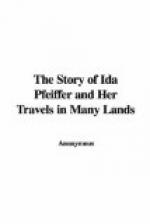Having satiated herself with admiring the lake and its surrounding scenery, she retired to a little nook roofed over with leaves, where her guide quickly kindled a good fire in the usual Indian fashion. He cut a small piece of wood to a fine point, and then selecting a second piece, grooved it with a narrow and not very deep furrow. In this he rubbed the pointed stick until the fragments detached during the process began to smoke. These he flung into a heap of dry leaves and grass previously collected, and swung the whole several times round in the air, until it broke out into flames. The entire process did not occupy above two minutes. Gathering a few plantains, these were roasted for supper; after which Madame Pfeiffer withdrew to her solitary couch of dry leaves, to sleep as best she might. It is impossible not to wonder at the marvellous physical capability of this adventurous woman, no less than at her courage, her resolution, and her perseverance. How many of her sex could bear for a week the fatigue and exposure to which she subjected herself year after year?
The next morning she accomplished the return journey in safety.
* * * * *
[Hong-Kong: page65.jpg]
On the 17th of May she left Tahiti, the Dutch vessel in which she had embarked being bound via the Philippines. They passed this rich and radiant group of islands on the 1st of July, and the next day entered the dangerous China Sea. A few days afterwards they reached Hong-Kong, which has been an English settlement since 1842. Here Madame Pfeiffer made no long stay, for she desired to see China and the Chinese with as little intermixture of the European element as possible. So she ascended the Pearl river, the banks of which are covered with immense plantations of rice, and studded with quaint little country-houses, of the genuine Chinese pattern, with sloping, pointed roofs, and mosaics of variously coloured tiles, to Canton, one of the great commercial centres of the Flowery Land. As she approached she surveyed with wonder the animated scene before her. The river was crowded with ships and inhabited boats. Junks there were, almost as large as the old Spanish galleons, with poops impending far over the water, and covered in with a roof, like a house. Men-of-war there were, flat, broad, and long, mounted with twenty or thirty guns, and adorned in the usual Chinese fashion, with two large painted eyes at the prow, that they may be the better able to find their way. Mandarins’ boats she saw, with doors, and sides, and windows gaily painted, with carved galleries, and tiny silken flags fluttering from every point. And flower-boats she also saw; their upper galleries decked with flowers, garlands, and arabesques, as if these were barks fitted out for the service of Titania and her fairy company. The interior is divided into one large apartment and a few cabinets, which are lighted by windows of fantastic design. Mirrors and silk hangings embellish the walls, while the enchanting scene is completed with an ample garniture of glass chandeliers and coloured paper lanterns, interspersed with lovely little baskets of fresh flowers.




